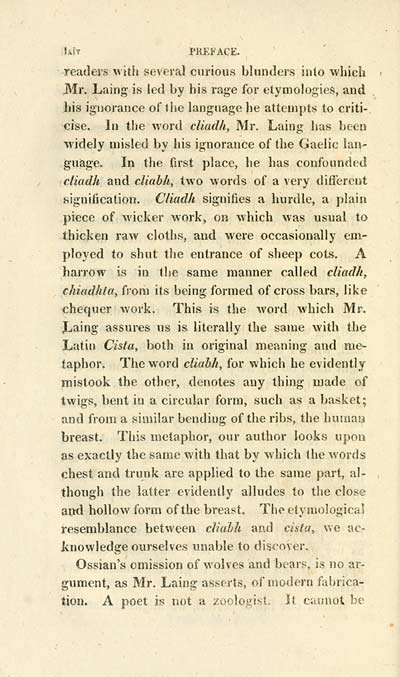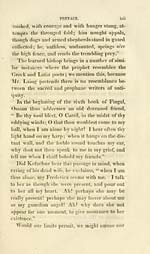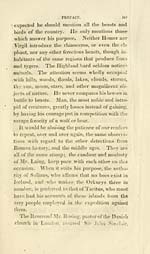Ossian Collection > Original collection of the poems of Ossian, Orrann, Ulin, and other bards, who flourished in the same age
(68)
Download files
Complete book:
Individual page:
Thumbnail gallery: Grid view | List view

Im PKEFACE.
readers wtdi several curious blunders inlo which
Mr. Laing is led by his rage for etymologies, and
his ignorance of tiie language he attempts to criti-
cise. In the word cliadh, Mr. Laing has been
widely misled by his ignorance of the Gaelic lan-
guage. In the first place, he has confounded
cliadh and cUabli, two words of a very difl'ereot
signification. Cliadh signifies a hurdle, a plain
piece of wicker work, on which was usual to
thicken raw cloths, and were occasionally em-
ployed to shut the entrance of sheep cots. A
harrow is in the same manner called cliadh,
chiadhla, from its being formed of cross bars, like
chequer work. This is the word which Mr.
jLaing assures us is literally the same with the
Latin Cisfa, both in original meaning and me-
taphor. The word cliabh, for which he evidently
mistook the other, denotes any thing made of
twigs, bent in a circular form, such as a basket;
and from a similar bending of the ribs, the humau
breast. This metaphor, our author looks upon
as exactly the same with that by which the words
chest and trunk are applied to the same part, al-
though the latter evidently alludes to the close
and hollow form of the breast. The etymological
resemblance between cliahh and cista, we ac-
knowledge ourselves unable to discover.
Ossian's omission of wolves and bears, is no ar-
gument, as Mr. Laing asserts, of modern fabrica-
tion. A poet is not a zoologist. It cannot be
readers wtdi several curious blunders inlo which
Mr. Laing is led by his rage for etymologies, and
his ignorance of tiie language he attempts to criti-
cise. In the word cliadh, Mr. Laing has been
widely misled by his ignorance of the Gaelic lan-
guage. In the first place, he has confounded
cliadh and cUabli, two words of a very difl'ereot
signification. Cliadh signifies a hurdle, a plain
piece of wicker work, on which was usual to
thicken raw cloths, and were occasionally em-
ployed to shut the entrance of sheep cots. A
harrow is in the same manner called cliadh,
chiadhla, from its being formed of cross bars, like
chequer work. This is the word which Mr.
jLaing assures us is literally the same with the
Latin Cisfa, both in original meaning and me-
taphor. The word cliabh, for which he evidently
mistook the other, denotes any thing made of
twigs, bent in a circular form, such as a basket;
and from a similar bending of the ribs, the humau
breast. This metaphor, our author looks upon
as exactly the same with that by which the words
chest and trunk are applied to the same part, al-
though the latter evidently alludes to the close
and hollow form of the breast. The etymological
resemblance between cliahh and cista, we ac-
knowledge ourselves unable to discover.
Ossian's omission of wolves and bears, is no ar-
gument, as Mr. Laing asserts, of modern fabrica-
tion. A poet is not a zoologist. It cannot be
Set display mode to: Large image | Transcription
Images and transcriptions on this page, including medium image downloads, may be used under the Creative Commons Attribution 4.0 International Licence unless otherwise stated. ![]()
| Early Gaelic Book Collections > Ossian Collection > Original collection of the poems of Ossian, Orrann, Ulin, and other bards, who flourished in the same age > (68) |
|---|
| Permanent URL | https://digital.nls.uk/77725553 |
|---|
| Description | Selected books from the Ossian Collection of 327 volumes, originally assembled by J. Norman Methven of Perth. Different editions and translations of James MacPherson's epic poem 'Ossian', some with a map of the 'Kingdom of Connor'. Also secondary material relating to Ossianic poetry and the Ossian controversy. |
|---|
| Description | Selected items from five 'Special and Named Printed Collections'. Includes books in Gaelic and other Celtic languages, works about the Gaels, their languages, literature, culture and history. |
|---|

